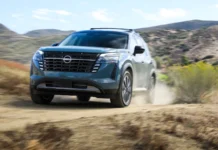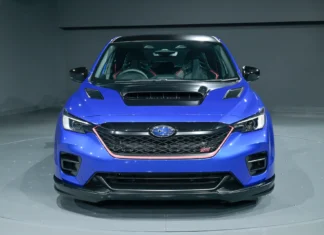
In this week’s Ask Nathan:
- Will we see a Honda Ridgeline Hybrid?
- Entry level battle: Wrangler Sport vs Bronco
- What to choose? EV vs PHEV..

Q: Nathan and Andre, do you think they will build a Honda Ridgeline Hybrid soon?
You mentioned it a few years back, but I haven’t see anything like a Ridgeline Hybrid mentioned since. I think that Honda is waiting to see how the front drive Maverick hybrid performs before they introduce one.
I bought a 2019 Honda Ridgeline with the 9 speed automatic transmission and it is the best vehicle I have owned ever. It has over 50 thousand kilometers on it despite sitting for 6 months during COVID. I drive it from Portland to Reno every other week for my job and it is as solid as a rock. Doesn’t matter what the weather is like or road conditions. It never fails to get me where I need to go.
I am grateful that you guys stand up for it against all the haters. So I guess I am starting to think about the future and about getting better mileage. Right now my average is just under 10 liters per kilometer. 21 or 22 miles per gallon. It gets a lot better on the highway where I’m closer to 25 miles per gallon. That is loaded with my equipment and at least one passenger.
So I am not complaining that much about mileage. I do want this performance with a more efficient option. That is why I am still curious about the Honda Ridgeline Hybrid. When you answered my email a while ago, you said it could happen soon.
I agree. Especially now. But what can Honda do right now? How can they go up against the smaller new trucks while still fighting with the mid size trucks? Please let me know what your insights are!
— Rodney

A: Hi Rodney!
Thanks for reaching out again! Everything below is based on speculation and a few insider’s comments. Honda has made NO official announcements about a Ridgeline Hybrid. The sweet looking renderings I’m showing you come from Rene Garcia, and they are based on a future EV or hydrogen version of the Ridgeline. Seriously though, if it looked this cool, sales would sky-rocket!
I still believe that Honda is taking a serious look at building a Ridgeline Hybrid. It makes sense, and Honda has a powertrain setup that could work.
The Honda CR-V hybrid may lead the way.
Imagine if they found a way to make the same 2.0-liter hybrid powertrain from the CR-V hybrid work in the Ridgeline… it could be a logical step. The combined horsepower is 212 and about 232 lbs-feet of torque, which is considerably less than the standard Ridgeline (280 horsepower & 262 lb-ft). The CR-V’s battery is 1.4 kWh, which is more of a buffer than a strict power source.
Still, it isn’t hard to image a boost in battery size and overall performance. The CR-V hybrid, which weighs under 3,800 pounds (loaded), is estimated to get 40 mpg city and 35 mpg highway by the EPA. That’s with standard, mechanical AWD. Can this powertrain be adapted for use in the Ridgeline?
Why not!?
The reason I noted the mechanical AWD system is based on packaging. Right now, in our market, Honda doesn’t use an electrically powered rear transaxle, like Toyota does. That’s a good thing for engineers. It could be one less thing to fully re-engineer, and I bet the Ridgeline’s platform would accept the components.
I know, I know – it’s not as easy as that. My point is: Honda has the components at hand to build it, which could cut expenses. It may all reside on how well the Ford Maverick and Hyundai Santa Cruz are received. Right now, I can tell you without a doubt, the entry-level Ford Maverick, which comes standard with a hybrid powertrain, is outstanding.
Hopefully, Honda will see this success and react.
— N
The next question comes from a viewer who is looking at the base models of the Jeep Wrangler four-door, and the entry-level Ford Bronco four-door.
Q: (Via: Twitter@NathanAdlen)
Choosing is hard!
When this who pandemic and supply nightmare ends and prices come back to Earth, I wanted to get a new Jeep Wrangler 4-door, or the Ford Bronco 4-door. Both of them as cheap as possible! I don’t care about features that much. I want something that is immediately capable off-road and is fun daily. What to choose?
— Z. Baily

A: Great question!
I wish you sent additional details, but I can at least show some differences between the two vehicles, and give you my general opinion. As you noted, prices are painfully high. Dealer markups and short supplies makes finding one at MSRP nearly impossible. That seems especially true for the Bronco, as it’s the new kid in town, and very popular.
Things will change – eventually.
As for your comparison? Lets go over the basics first. Both trucks are closely matched in terms of pricing and some equipment. The Jeep offers a variety of engine options, including a plug-in hybrid, diesel and V8 – among others. These powertrains require higher trim levels, and a lot of extra dough. On the other hand, the Bronco has just two powertrains: the base four-banger turbo, and a twin-turbo V6.
This Bronco comes with 3.73 gearing, and open diffs.
2022 Ford Bronco four-door
The 2022 Ford Bronco four-door has a base price of $34,945; that’s with destination charges. You get a four-door soft-top and plenty of standard tech. It comes with a 2.3-liter turbocharged four-cylinder engine making 275 horsepower. Mated to a 10-speed automatic transmission, that transmission can easily handle its 315 lb-ft of torque.
There is a seven-speed manual transmission available, but only with the two-door base model – or, on the next level Big Bend model. Odd.

2022 Jeep Wrangler Unlimited (four-door) Sport
With a base price of $34,165 (that’s with destination), the Jeep Wrangler is a bit less expensive than the Ford. Keep in mind, you have to choose white and the six-speed manual transmission to get the bargain basement pricing. The powertrain consists of the tried-and-true 3.6-liter Pentastar V6 that makes 285 hp and 260 lb-ft of torque.
This Wrangler comes with a 3.45 gearing and open diffs.
Right out of the box, both vehicles shine in different arenas. The Ford Bronco is more comfortable, provides a bit more usable utility, and is a better road vehicle. This is especially true if you’re a larger person, as the interior space is far more commodious than the Jeep.
The Jeep Wrangler is more at home in the rough than the Bronco, but only on choppy, tight terrain. Having front and rear solid axles, and a slightly narrower build helps on the trails. As a personal choice, I do like having the manual transmission as an option on the base model.
Which would I choose?
As a family man, the Bronco makes more sense. Although not quite as efficient as the Wrangler (they both get crappy mileage) it has more usable space and is a nicer daily driver. With that being said, the kiddos are growing up – so I would prefer getting the Wrangler, after they’re gone.
One more thing: you’re smart to wait a while. Eventually, prices will come back down.
— N
The last question comes from a young fan who wants to figure out which is more logical, an EV or a PHEV.
Q: Hi Roman, Nathan, Andrew, Tommy, Alex, Case and Blaze! (Wow, I think I got everybody!).
I have watched lots of The Fast Lane videos ever since I was in 3rd grade. I’m starting 8th grade and I am STILL WATCHING! You guys drive more EVs and PHEVs then anyone I’ve seen on the net. I think your perspective is great for the real person.
My parents are both teachers in Loma Linda, California and they know nothing about cars. My dads Nissan Altima is falling apart. It has like 200,000 miles on it or more and moms Honda CRV is like 20 years old. So I have talked to both of them about replacing their cars with EVs or PHEVs.
But I am having a hard time explaining the differences between the two for them to understand. I was thinking that having one of each would be a good idea. You see that way we could do commuting in the EV and road trips in the PHEV. That makes a lot of sense to me and I think they would be okay with that if they understood what I’m talking about.
Also I forgot to say that they are both ready to replace the cars I mentioned. We just moved in with my Tio last March and there is no more house payment to worry about. Mom and dad take car of Tio and this is now our house. So they can afford to buy newer cars.
Can you explain in your words how each car has benefits? My parents are the smartest dumb people I know and they both like Sci Fi stuff.
Can you help Nathan?
— Navarro
A: Hi Navarro!
If I’m reading your email correctly, you want me to speak directly to your parents about the benefits of EVs (electric vehicles) and PHEVs (plug in hybrids)? Gotcha!
Let’s start with EVs:
An electric vehicle is powered by a battery that, like a cellphone, needs to be charged often. The range on these vehicles varies from 80 – 500 miles, depending on the vehicle. While they seem complex, EVs are very simple. They only have a few moving parts, and require very little maintenance.
Older EVs have some issues with power storage depletion. Just like computers and cellphones, the batteries will lose their ability to hold a charge over time. Usually, on many older EVs, the ability to store power drops over time. Replacing batteries can be very expensive. Some EVs come with extended battery warranties, and newer ones have more robust batteries.
Compared with gasoline, powering up an EV is much less expensive. If you charge from home, off peak hours, charging can be extremely cheap. Still, charging stations are few and far-between, when compared to gas-stations. In time, many more will sprout up.
PHEV (Plugin Hybrid Electric Vehicle):
PHEVs are far more complex than a regular EV or a regular gas vehicle. They use two powertrains to make the most out of each gallon of fuel. Like an EV, they can be plugged in at home, but they can also run on gasoline.
PHEVs tend to have a limited range on all electricity depending on the model. Still, most can do a majority of their daily commute on electricity alone. The average American’s daily round trip commute is about 25 miles.
On top of the all electric potential, PHEV’s can be driven long distance if needed. PHEV’s are very flexible, but they can cost more than a EV or gas-powered vehicle to maintain. Based on the complexity of having two motivators, two power storage (gas and electricity) locations, and the brains to make it all work, they are pricy to service.
Fortunately, most modern hybrids and PHEVs have proven themselves to be pretty reliable.
I hope that helps explain their basic pros and cons!
Good luck!
— N
Speaking of needing good luck…Check out something that’s definitely NOT an EV or PHEV..

























